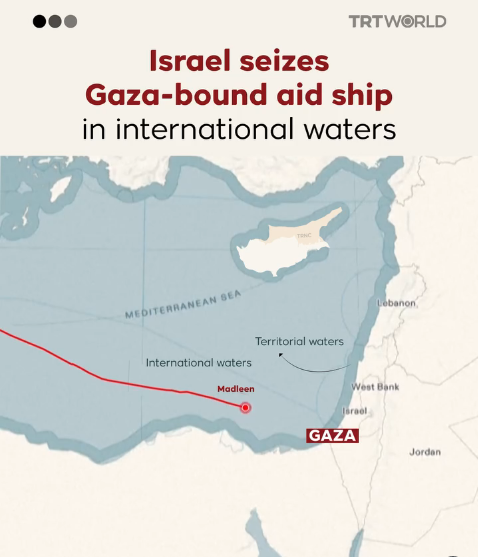The legal case against the boarding of the MV Madleen

Yet again, Israel seems to act with impunity when it breaks international law.
It's a basic principle: you are not allowed to board a foreign vessel, seize it and kidnap the crew in international waters. Imagine the furore if say, Iran or Yemen had done this.
Under the Law of the Sea, particularly the United Nations Convention on the Law of the Sea (UNCLOS), the unauthorised boarding and detention of civilians by a state actor in international waters is a serious breach of international law.
And, given that it was flying under a British flag and given his position so far on the Gaza conflict, I wouldn't want to be Sir Kier Starmer this morning.
1. Jurisdiction in International Waters
- In international waters (the high seas), ships are generally under the exclusive jurisdiction of the flag state (the country whose flag the ship flies).
- Other states cannot legally board, search, or detain individuals on a foreign-flagged ship without consent, except in narrowly defined exceptions (e.g piracy, slave trade, unauthorised broadcasting, stateless vessels, or with UN Security Council authorisation).
2. Illegal Boarding and Detention
- If a state actor boards and detains civilians without legal justification, this can constitute:
- A violation of UNCLOS and international human rights law.
- An act of kidnapping or unlawful detention under international criminal law.
- Potential grounds for diplomatic protest, legal claims, or even use of force in self-defence by the affected state.
3. Is It an Act of War?
- Not necessarily. Under international law, an act of war or armed attack (as defined in the UN Charter, Article 51) usually involves use of armed force between states.
- However, forcibly abducting civilians in international waters, especially if state-sanctioned and done repeatedly or with armed force, could escalate to what some states might consider a casus belli (justification for war), but this is politically sensitive and not automatic.
4. What Could It Be Considered Instead?
- A gross violation of international law.
- A hostile act or provocation.
- Possibly state-sponsored piracy or unlawful interference.
- Grounds for international sanctions, lawsuits in international courts, or UN Security Council action.
So in this context, here’s what happened this morning (9 June 2025) regarding the MV Madleen: Overview of Today’s Incident
- Israeli naval forces intercepted and boarded the British‑flagged aid ship Madleen in international waters, en route to Gaza with 12 activists, including Greta Thunberg and French MEP Rima Hassan ft.com+15theguardian.com+15skwawkbox.org+15.
- The activists were detained and the vessel was redirected to the port of Ashdod, Israel theguardian.com.
- The Israeli government claims it intends to repatriate the crew via their home countries and redistribute the aid through official channels aljazeera.com+15theguardian.com+15en.ara.cat+15.
Legal and Political Context
- Organizers from the Freedom Flotilla Coalition describe the ship as a humanitarian effort challenging Israel’s naval blockade, carrying aid like baby formula, food, medical kits, and menstrual products en.ara.cat+15en.wikipedia.org+15ft.com+15.
- The interception in international waters has sparked strong backlash and allegations of illegal ‘piracy’ from rights groups and activists theguardian.com.
- Israeli officials justify the move by citing security concerns, warning their military would prevent all such flotillas from reaching Gaza en.wikipedia.org+12reuters.com+12arynews.tv+12.
Immediate Aftermath & International Reaction
- Activists and allied NGOs, including the Council on American Islamic Relations, condemned the interception as “state terrorism” and a violation of international law en.wikipedia.org.
- Demonstrations erupted in several countries calling for the immediate release of the detained activists couriermail.com.au.

What This Means Next
- The Madleen crew is expected to be deported imminently.
- The diverted aid may still reach Gaza, but through Israeli-controlled humanitarian channels, not via the flotilla.
- This incident is likely to fuel further international debate and criticism over the blockade and Israel's maritime enforcement tactics.
The legal stakes of Israel's interception of the MV Madleen in international waters are complex and serious. Here’s a breakdown of the main legal frameworks and how this act could be interpreted: 1. United Nations Convention on the Law of the Sea (UNCLOS) General Rule:
- Ships on the high seas (international waters) are subject to the exclusive jurisdiction of their flag state (in this case, the UK).
- No other state may board or interfere unless specific exceptions apply.
Legal Exceptions to Interception: Under Article 110, a warship may board a foreign ship on the high seas only if:
- Engaged in piracy,
- Involved in the slave trade,
- Unauthorised broadcasting,
- Appears stateless, or
- There are reasonable grounds to suspect it is engaged in any of the above.
None of these exceptions seem to apply to the MV Madleen, a British-flagged humanitarian vessel.
In accordance with the San Remo Manual (1994) Israel claims a naval blockade of Gaza, which it argues gives it the right to intercept ships breaching it, even in international waters, if:
- The blockade is declared, publicised, and effective.
- The intercepted ship is bound for the blockaded area.
- Humanitarian access is provided through alternative routes.
Legal Debate
- Critics argue the blockade is disproportionate, amounts to collective punishment, and violates international humanitarian law (IHL).
- Israel argues its blockade is lawful under the laws of armed conflict, citing security threats from Hamas.
If the MV Madleen was lawfully trying to breach a legal blockade, Israel may claim its action was legitimate, but this is heavily contested internationally. 3. Detention of Civilians and Humanitarian Workers
- Forcible detention of civilians, especially humanitarian workers and elected officials (like an MEP), may violate:
- Human rights treaties (e.g., ICCPR),
- Diplomatic protections,
- Possibly even rise to arbitrary detention or state-sponsored abduction.
If excessive force or mistreatment is proven, individual state responsibility or personal liability may apply under international law.
Political and Diplomatic Consequences
- Accusations of piracy, state terrorism, or aggression have already been raised by rights groups.
- The UK, France, and other EU states may pursue diplomatic protests or legal actions.
- There’s potential for referral to the International Criminal Court (ICC), especially if the act fits within a broader pattern.
Legally, Israel's interception of the MV Madleen likely violated UNCLOS, unless it can defend the blockade’s lawfulness and necessity.
Politically, this is a highly charged and risky move that could further erode Israel’s international standing.
The balance between security and humanitarian law is at the heart of the legal stakes.
The legality of Israel’s naval blockade of Gaza, which underpins its justification for intercepting ships like the MV Madleen, is disputed under international law.
Legal Framework:
The San Remo Manual on International Law Applicable to Armed Conflicts at Sea (1994) While not a treaty, the San Remo Manual reflects widely accepted customary international law and outlines when a blockade is lawful. Requirements for a Lawful Blockade:
- Declaration and Notification: Must be declared and notified to all belligerents and neutral parties.
- Effectiveness: Must be physically enforced by sufficient force to prevent entry/exit.
- Non-discrimination: Must apply equally to all vessels of all nations.
- Proportionality: Cannot cause excessive damage to the civilian population in relation to the anticipated military advantage.
- Access to Humanitarian Relief: Must allow passage of humanitarian aid if civilians are inadequately supplied, subject to inspection.
Israel’s Position
Israel imposed the blockade on Gaza in 2007, citing Hamas control and the threat of weapons smuggling.
- It claims:
- The blockade is military necessity under the laws of armed conflict.
- Humanitarian aid is permitted through designated land crossings, not unauthorised sea routes.
- Enforcement extends to international waters under the blockade regime.
Opposing Legal Views
Many international bodies and legal scholars dispute the legality of the blockade:
Disproportionate Harm:
- The blockade has a devastating impact on Gaza's civilian population, limiting access to food, medicine, fuel, and rebuilding supplies.
- May violate the principle of proportionality under IHL.
Collective Punishment:
- Critics argue the blockade punishes all of Gaza’s population for the actions of Hamas, which is prohibited under Article 33 of the Fourth Geneva Convention.
Denial of Humanitarian Access:
- Israel has allegedly denied or restricted humanitarian shipments, violating customary international law.
UN and ICRC Views:
- The UN Human Rights Council, UN General Assembly, and organisations like the International Committee of the Red Cross (ICRC) have called the blockade illegal and inhumane.

Key Legal Precedents
- 2011 Palmer Report (UN): Found the blockade legal under international law, but said the boarding of the Mavi Marmara was excessive and unreasonable.
- UN Human Rights Council 2010: Found the blockade unlawful and the flotilla raid a breach of human rights and international law.
There is no unified international legal consensus. Some institutions uphold the blockade’s legality under certain conditions; others call it a breach of international law. Given that the MV Madleen was a British-flagged vessel boarded by a foreign military in international waters, the UK government is entitled, if not obligated, to respond strongly, both diplomatically and legally. Here are the key elements of what a measured but firm UK response could (and arguably should) include: 1. Official Diplomatic Protest
- The UK should issue a formal diplomatic demarche to Israel, demanding:
- A full explanation and legal justification for the boarding.
- The immediate release of any detained British nationals or passengers.
- Respect for UK-flagged vessels in international waters.
Why:
- The UK has sovereignty over ships flying its flag, per UNCLOS.
- Unauthorised interference is a breach of international maritime law unless a valid exception applies.
Legal Review and Potential Action
- Launch an independent legal review into whether the act violated:
- The UN Convention on the Law of the Sea,
- International human rights or humanitarian law,
- And the rights of British citizens aboard.
Possible Legal Actions:
- Bring a case to the International Tribunal for the Law of the Sea (ITLOS) or the International Court of Justice (ICJ) (potentially with other states).
- Support individual complaints or evidence gathering for the International Criminal Court (ICC) if war crimes or unlawful detention are alleged.
Multilateral Pressure
- Coordinate with European partners (especially France, since a French MEP was on board) and Commonwealth allies.
- Seek a UN Security Council session or General Assembly resolution condemning unauthorised naval actions.
Why:
- Multilateral action reinforces that flag-state rights and freedom of navigation are global principles—not bilateral grievances.
Protecting Future UK-Flagged Vessels
- The UK could issue naval escort warnings or enhance maritime advisories for vessels sailing in contested zones.
- If diplomatic efforts stall, it could sanction individuals or military units directly responsible for the incident.
Red Lines and Reputational Stakes Failure to respond forcefully would:
- Set a dangerous precedent that UK-flagged ships are not protected beyond territorial waters.
- Undermine UK leadership on international maritime norms and rule of law.
- Risk domestic political fallout, especially if UK citizens were detained or harmed.

And what about the UK Government and Starmer?
The seizure of the MV Medleen, a British-flagged vessel has thrust Sir Keir Starmer into one of the most politically combustible dilemmas of his leadership, one where any action, or lack thereof, carries significant consequences. The UK’s response, if it is to align with its own legal and ethical standards, must be firm, lawful, and multilateral. It must demonstrate a commitment to the law of the sea, protect its citizens and maritime rights, and prevent future violations through coordinated diplomatic pressure. Anything short of this would suggest a dereliction of duty by the UK Government and imply tacit complicity in violations of international law.
In this moment, silence is not neutrality, it is betrayal. Were the perpetrator any nation other than Israel, there would be loud condemnation and swift action. The failure to respond firmly risks sending a chilling signal: that the UK is willing to overlook breaches of international law when committed by allies.
Such inaction, especially amid credible allegations of war crimes, suggests moral abdication and geopolitical favouritism. For Starmer, the political stakes are even higher. If his government fails to act decisively, it may be seen as endorsing or enabling war crimes, a grave charge that would severely damage the UK’s credibility. But if he does act forcefully, it would raise difficult questions about why the UK has not done so earlier. Such a shift would effectively admit that the UK has been shielding Israel from scrutiny, undermining the ICC and UN positions it claims to support. This is particularly perilous given the UK’s long-standing commitment to freedom of navigation and international maritime law. Inaction now, in the face of growing international concern over Gaza and ongoing ICC investigations, risks being seen as political alignment over principle and deeply corrosive to the UK’s standing on human rights and the rules-based international order.
If the government chooses a more assertive stance, it could open the door to scrutiny of its previous inconsistencies. These include past votes against ICC investigations into Israel, continued arms sales despite ICJ warnings, and muted responses to flotilla raids and civilian casualties in Gaza. A robust response now could appear to be too little, too late: an implicit admission that strategic interests have long trumped moral consistency.
Starmer also faces a domestic political minefield. Labour’s base, particularly its youth factions and trade unions, are growing increasingly vocal in their demands for principled leadership. Any perceived weakness or equivocation may fracture internal support. Yet a firm stand could jeopardise sensitive relations with Israel and the United States. Starmer is caught between the UK's legal obligations and its entangling alliances, with little room to manoeuvre without damage.
Perhaps an independent inquiry might offer Starmer a way to reclaim the moral high ground, allowing him to 'review the facts' without overt condemnation. He could reaffirm respect for the ICC while framing the response in a multilateral context via the UN or EU. But the appetite for nuance is waning. His characteristic Fence-sitting may only reinforce perceptions of hypocrisy and moral failure, further feeding narratives of complicity in what some legal experts now describe as genocide. A a former Director of Public Prosecutions, he clearly cannot claim ignorance of the nuances of international law. In the court of public opinion, and possibly even the ICC, the stakes for Starmer are rapidly escalating. His government's next move will not just define the UK’s position on this crisis, it may define his legacy.
The world has gone mad. If you enjoyed reading this, please feel free to look at the rest of the blogs on www.TetleysTLDR.com. They're free to view, there's no paywall, they aren't monetised and I won't ask you to buy me a coffee. Also please free to share anything you find of interest, we only get the message out if people are aware of it. Just a leftie, standing in front of another leftie, asking to be read. All the best, Tetley

